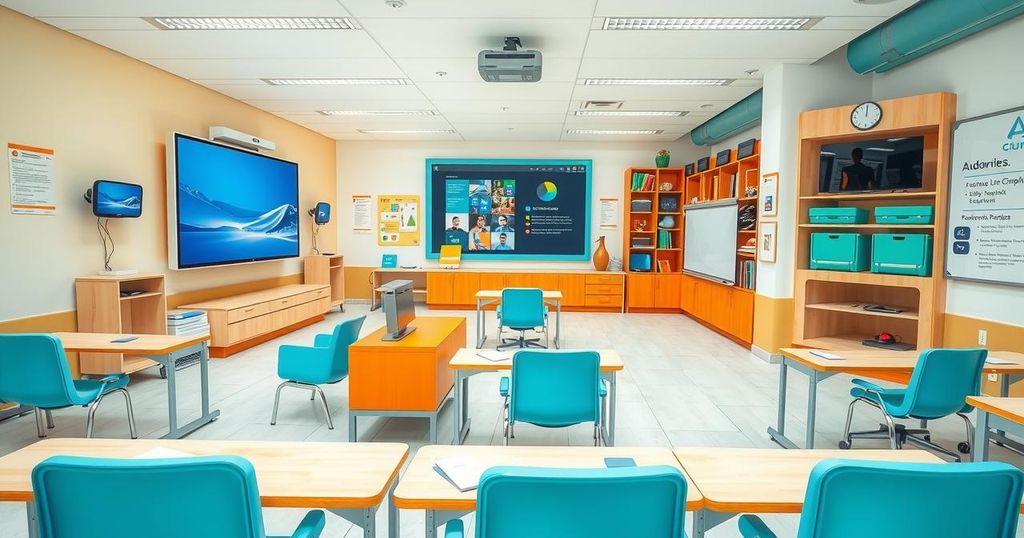The 9 Most Interesting EdTech Trends of 2024
2024 brings transformative trends in education technology, including AI integration in learning, innovative homeschooling solutions, immersive learning experiences, and the expansion of workplace eLearning. As education seeks to become more accessible and personalized, these trends highlight a collective aim to improve how knowledge is shared and embraced globally.
The landscape of education technology (EdTech) is shifting rapidly, and 2024 brings an exciting array of transformations aimed at enhancing learning outcomes globally. Among the leading trends are the integration of AI into education, innovative homeschooling solutions, immersive learning experiences, and the rise of workplace eLearning. Organizations are now leveraging tech to make education more accessible, personal, and engaging than ever before.
1. AI Reaches All Areas Of Education
Educators are embracing AI tools, with 60% of US teachers already incorporating them into their classrooms. AI is recognized for its potential to enhance learning experiences, as evidenced by Squirrel AI’s remarkable growth in personalized education. With tools like Copyleaks streamlining grading processes and chatbots supporting administrative tasks, AI is becoming integral in educational environments.
2. Innovative K-12 Homeschooling Startups Spring Up
With 6.7% of American school-aged children now homeschooled—a significant increase—EdTech startups like Prisma and Outschool are transforming homeschooling. By providing tech-savvy solutions that connect students to live, interactive classes, these platforms meet the growing demand for modernized education outside traditional frameworks.
3. Tech-Enabled Immersive Learning Becomes More Accessible
Extended reality (XR) continues to make educational experiences more engaging. Affordable VR headsets and innovative applications like Labster and Google Expeditions are revolutionizing learning. These technologies allow students to perform virtual experiments and embark on virtual field trips, making immersive learning accessible and effective for various subjects and learning styles.
4. Workplace eLearning Continues To Grow
As 52% of workers feel undertrained, eLearning in workplace environments is flourishing. Platforms like Eduson and Udemy are at the forefront, offering scalable training solutions that are cost-effective and flexible. With the global eLearning market projected to exceed $500 billion by 2028, the trend towards digital learning in professional spaces is undeniable.
5. The Fight For Access To Education Continues
Despite progress, 250 million children globally still lack access to education. EdTech initiatives like Kukua are aiming to bridge this gap through engaging learning tools. Mobile-first solutions and open educational resources seek to democratize education, presenting opportunities for underserved communities.
6. Adaptive Learning Supercharged By AI
Adaptive learning is revolutionizing personalized education. Thanks to AI, platforms can now tailor lessons to individual student needs in real-time, providing custom-fit educational experiences. Successful tools like Thinkster and DuoLingo illustrate the effectiveness of this approach, showcasing improved learning outcomes.
7. Gamification Goes Nowhere
Gamification remains prevalent in education, with game-based learning tools like Minecraft and Roblox captivating students. Educational apps are incorporating game mechanics to make learning fun, interactive, and competitive, leading to heightened engagement in classrooms.
8. Google Everything
Google’s presence in education is unshakeable, with Chromebooks becoming a staple learning device. Complemented by tools like Google Workspace for Education and Google Classroom, educators can streamline communication, assignments, and collaboration among students seamlessly.
9. Accelerating Investments In EdTech
The EdTech sector is witnessing an impressive surge in investments, reflecting the current trends. Noteworthy cases like Merlyn Mind’s recent funding underscore the emphasis on AI-assisted technologies aimed at enhancing educational access and quality. Europe is emerging as a significant player, with an increase in EdTech investments that could reshape the industry landscape.
This era heralds a pivotal change in education, powered by innovative technologies and a collective push for inclusivity and effectiveness in learning. 2024 is set to redefine how knowledge is imparted, ensuring that every learner, irrespective of their background, has the opportunity to thrive in an increasingly complex world.
In summary, 2024 is witnessing a revolution in educational technology. From the integration of AI in learning environments to the proliferation of eLearning and immersive technologies, the trends showcased reflect a commitment to enhancing learning accessibility and personalization. As EdTech continues to evolve, it holds the potential to reshape educational landscapes for future generations, paving the way for engaging and effective learning experiences everywhere.
Original Source: explodingtopics.com




Post Comment